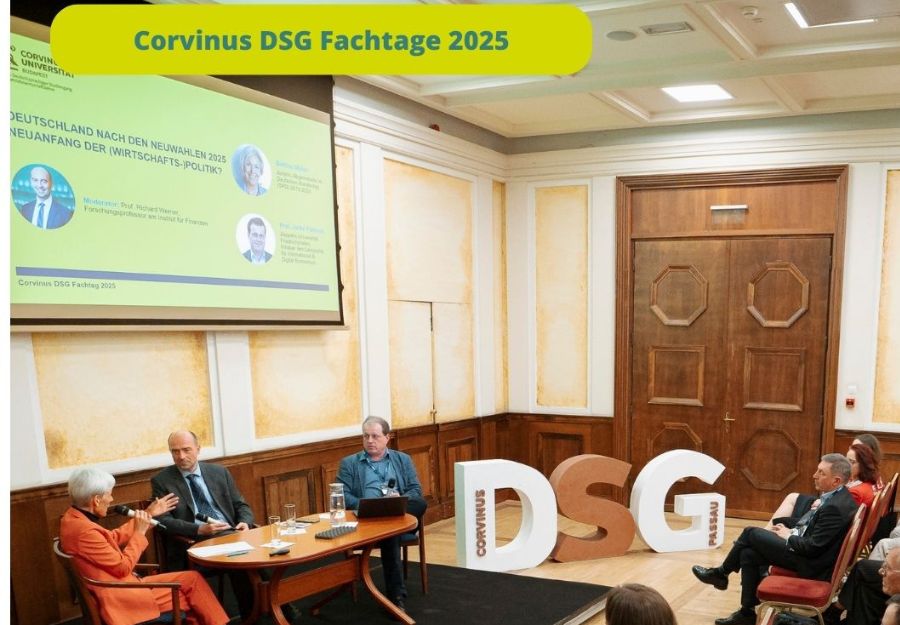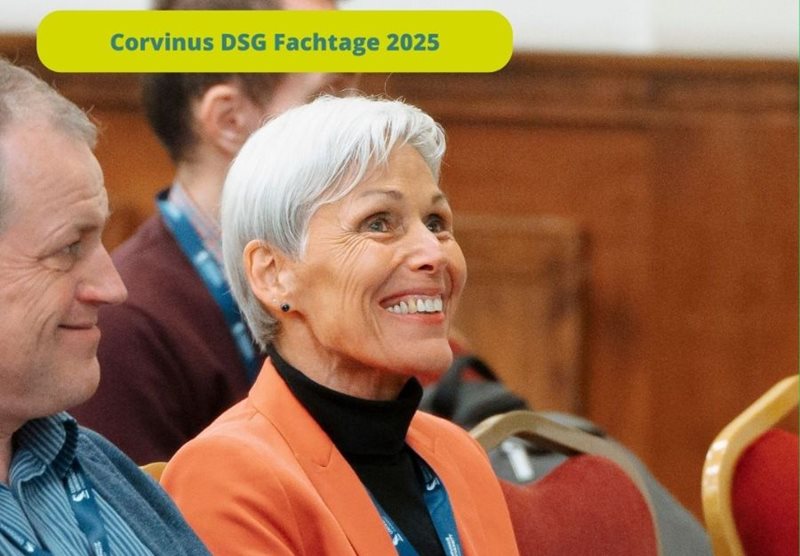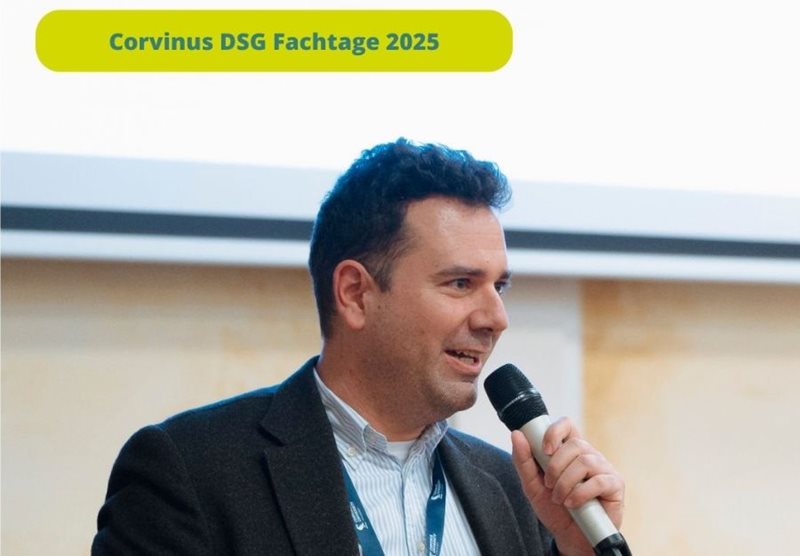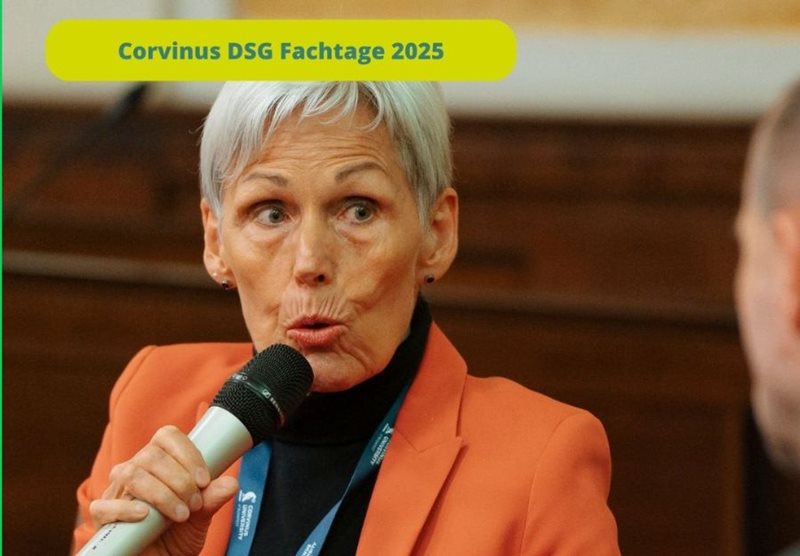Corvinus DSG Symposium 2025 – Stable partnerships and the need for a respectful discussion culture

Germany is planning to strengthen its infrastructure and military, while at the same time continuing to take measures to achieve its climate targets – and is preparing to take out loans on an unprecedented scale. In this process, economic and political relations between Hungary (and the EU) are of particular importance, as we are interdependent for geopolitical reasons. We look back with gratitude on an intensive week focussing on German-speaking relations at the Corvinus University of Budapest.

On 31 March 2025, the German Ambassador to Hungary, Julia Groß, paid an informal visit to the Rector of Corvinus University, Prof. Bruno van Pothelsberghe. The meeting was an important step in the further development of Corvinus University’s internationalisation strategy, with a particular focus on Germany. The VIP guests of the DSG Symposium 2025 – Bettina Müller, SPD, Member of the German Bundestag between 2013 and 2025¸ and Prof Jarko Fidrmuc, the Chair of International & Digital Economics at Zeppelin University in Friedrichshafen, Germany – were also welcomed personally by Prof van Pothelsberghe. A very convivial German-language podcast with the VIP guests was also hosted in the university’s media studio on 1 April, by PhD student Adrian Amon.

On 2 April, several German and Austrian partner companies and organisations exhibited at the Corvinus Career and Business Festival. DSG’s corporate and organisational partners who took part in the CCBF included the German Academic Exchange Service (DAAD), the German-Hungarian Chamber of Industry and Commerce (DUIHK), SAP, KPMG, LeitnerLeitner tax consultants and auditors and the University of Passau Alumni Association as representatives of several Bavarian companies.
That afternoon, Prof Fidrmuc from the University of Friedrichshafen gave an academic lecture on the challenges and financing of the energy transition. He emphasised that global warming is one of the greatest challenges of the 21st century. Even though society is increasingly sensitised to the issue, there is still fear of the necessary technological and economic changes. Professor Fidrmuc also presented a large-scale empirical study in which energy policy and financial data from 32 countries – including both developed and developing countries – were analysed. In their research, they analysed two main indicators: the share of renewable energy per capita and CO₂ emissions per unit of GDP. The analysis showed that the more developed a country is, the higher its emissions are. At the same time, the Sustainable Development Goals (SDGs) have a positive influence on green investments and can also motivate financial institutions to finance the green transformation
The study also revealed that green funds and private investors who are involved via the stock exchange could play an important role in future energy financing. The question is no longer whether there should be a green transformation, but how it can be realised sustainably and economically. Prof Fidrmuc also pointed out the dependence on rare earths, which are essential for the energy transition, as well as potential market dominance.
The highlight of the event was a panel discussion in which Ms Müller, Member of the German Bundestag, and Prof. Fidrmuc discussed the topic ‘A new start for (economic) policy? – Germany after the new elections’, moderated by Prof Richard Werner, research professor at Corvinus University. Ms Müller and Prof. Fidrmuc emphasised that the debt package of 1000 billion euros recently passed by the German Bundestag opens up a new perspective for Germany, which is urgently needed in the times we live in today. Strengthening Germany is not only imperative in the area of defence, but the energy transition started by the previous government should also be continued. Strengthening the infrastructure was also unavoidable.
Ms Müller emphasised that the financial package agreed was a ‘historic compromise’ between the SPD, CDU/CSU and the Greens. It was not the debt that would burden future generations – it would be the massive deficits in infrastructure, climate protection and defence if no action was taken. In Ms Müller’s opinion, decision-making processes in Germany are too slow, especially when it comes to infrastructure development. She nevertheless rejected the idea of centralisation and emphasised the value of the identity and competence of the federal states.
China’s trade policy, which could be a decisive factor in future energy policy, was also addressed during the discussion. Ms Müller and Prof Fidrmuc agreed that green energy was the right way forward, but that it was still inaccessible for many economies due to its costs. The solution lies in the harmonisation of financial markets, investors and state regulations.
The panel discussion was followed by company pitches: five partner companies and organisations (DUIHK, DAAD, University of Passau, SAP and KPMG) introduced themselves to the student body. Finally, an elegant reception provided an opportunity to exchange ideas with guests from academia, politics and business.

The DSG Symposium was a complete success and was highly informative. We would like to thank all participants and interested parties for attending our fully booked events.
At the same time, we would like to emphasise that Corvinus University Budapest as a whole, including the DSG, attaches great importance to listening to and discussing different opinions and views in a balanced manner. If anyone has been given the impression that certain political opinions have been given more space than others, we sincerely apologise. In the future, we will strive to do even more to strengthen an open and respectful culture of discussion at our German-language events.
We thank our sponsors for their generous support: DAAD, SAP